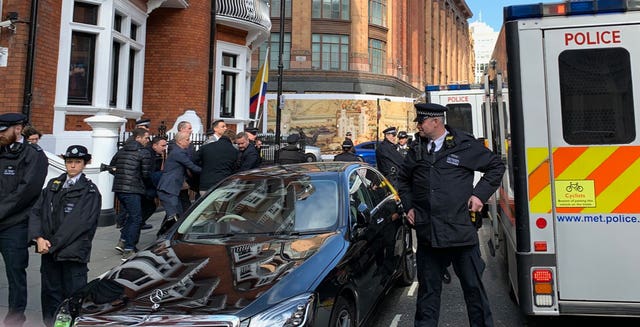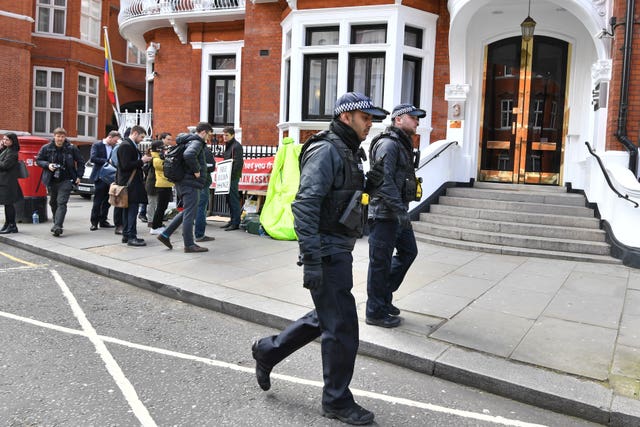
Julian Assange faces extradition to the US after he was arrested and forcibly removed from the Ecuadorian embassy in London almost seven years after he sought refuge there.
Police detained the WikiLeaks founder after the Ecuadorian government withdrew his asylum, blaming his “repeated violations” of “international conventions and daily-life protocols”.
Scotland Yard said in a statement that Assange was held for failing to appear in court in June 2012 and “further arrested on behalf of the United States authorities, at 10.53am after his arrival at a central London police station”.
In a statement, the Home Office said: “We can confirm that Julian Assange was arrested in relation to a provisional extradition request from the United States of America.
“He is accused in the United States of America computer related offences.”
In a tweet, Assange’s lawyer Jennifer Robinson also said he had been “arrested not just for breach of bail conditions but also in relation to a US extradition request”.
The US Justice Department inadvertently revealed the existence of a criminal case against Assange in a court filing last year.
Ms Robinson said he faces a charge of conspiring with former US Army intelligence analyst Chelsea Manning, who leaked a trove of classified material to WikiLeaks in 2010.

Assange was seen shouting and gesticulating as he was carried from the embassy in handcuffs by seven men and put into a waiting Metropolitan Police Service (MPS) van shortly after 10am on Thursday.
Scotland Yard said: “The MPS had a duty to execute the warrant, on behalf of Westminster Magistrates’ Court, and was invited into the embassy by the Ambassador, following the Ecuadorian government’s withdrawal of asylum.”
Ecuador’s president Lenin Moreno said on Twitter: “In a sovereign decision Ecuador withdrew the asylum status to Julian Assange after his repeated violations to international conventions and daily-life protocols.”
In a sovereign decision Ecuador withdrew the asylum status to Julian Assange after his repeated violations to international conventions and daily-life protocols. #EcuadorSoberano pic.twitter.com/pZsDsYNI0B
— Lenín Moreno (@Lenin) April 11, 2019
UK government ministers welcomed the move with both Home Secretary Sajid Javid and Foreign Secretary Jeremy Hunt tweeting that “no-one is above the law”.
Mr Hunt said: “Julian Assange is no hero and no one is above the law. He has hidden from the truth for years.
“Thank you Ecuador and President Lenin Moreno for your cooperation with the Foreign Office to ensure Assange faces justice.”
But WikiLeaks said Ecuador had acted illegally in terminating Assange’s political asylum “in violation of international law”.
URGENT: Ecuador has illigally terminated Assange political asylum in violation of international law. He was arrested by the British police inside the Ecuadorian embassy minutes ago.https://t.co/6Ukjh2rMKD
— WikiLeaks (@wikileaks) April 11, 2019
His arrest comes a day after Wikileaks accused the Ecuadorean Government of an “extensive spying operation” against Assange.
WikiLeaks, a whistle-blowing website, claimed meetings with lawyers and a doctor inside the embassy over the past year were secretly filmed.
Supporters of Assange also reported increased police activity at the embassy in recent days.

Australian Assange came to prominence after WikiLeaks began releasing hundreds of thousands classified US diplomatic cables.
But in 2010 an arrest warrant was issued for him for two separate allegations – one of rape and one of molestation – after he visited Sweden for a speaking trip.
Assange launched a legal battle against extradition to Sweden from the UK but when that failed he entered the embassy, requesting political asylum.
Assange refused to leave, claiming he would be extradited to the US for questioning over the activities of WikiLeaks if he did so.
The Ecuadorian government at the time was sympathetic to his cause but a regime change in 2017 heralded a less supportive approach and after 2,487 days in the embassy building in the shadow of Harrods, he was finally removed.
In May 2017, Sweden’s top prosecutor dropped a long-running inquiry into a rape claim against Mr Assange.
The Swedish woman who alleged that she was raped by Assange welcomed his arrest.
Elisabeth Massi Fritz, who represents the unnamed woman, said the news was “a shock to my client” and something “we have been waiting and hoping for since 2012”.
Ms Massi Fritz also said, in a text message sent to The Associated Press, “we are going to do everything” to have the Swedish case reopened “so Assange can be extradited to Sweden and prosecuted for rape.”
And she added that “no rape victim should have to wait nine years to see justice be served”.


Comments: Our rules
We want our comments to be a lively and valuable part of our community - a place where readers can debate and engage with the most important local issues. The ability to comment on our stories is a privilege, not a right, however, and that privilege may be withdrawn if it is abused or misused.
Please report any comments that break our rules.
Read the rules here